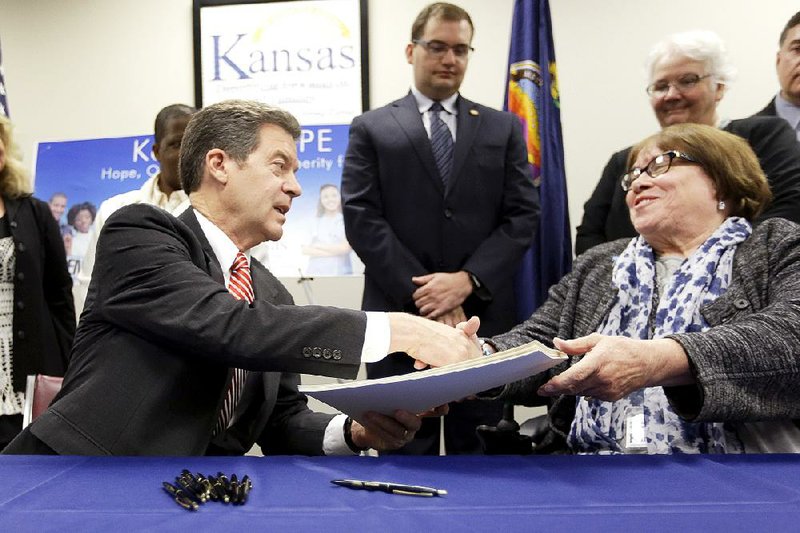TOPEKA, Kan. -- Gov. Sam Brownback signed a bill Thursday that will establish stricter requirements for welfare eligibility, set shorter time limits for how long a person can receive benefits and place new restrictions on where a beneficiary can spend money.
Brownback touted the bill as a way to promote self-reliance and lift people out of poverty by pushing them back into the workforce during a signing ceremony at the Department for Children and Families' service center in Topeka.
The governor and department Secretary Phyllis Gilmore pushed back against national criticism that has been levied against the bill in recent weeks. Gilmore called the bill the most comprehensive welfare overhaul passed by any state in the country.
"We encourage other states to look to Kansas on how to help end government dependency," Gilmore said. She said the policies are aimed at helping low-income people achieve self-sufficiency and called government dependency a "disservice to the individual, a disservice to our culture and certainly a disservice to the taxpayer."
The bill incorporates in law several policies adopted during Brownback's first term, including a requirement that able-bodied adults work a minimum of 20 hours a week or go through a job-training program to qualify for Temporary Assistance for Needy Families. The Department for Children and Families credits this policy with putting more than 6,000 people back into the workforce last year.
By signing the law, Brownback ensures that the policies will continue after he leaves office.
But the features of the bill that have gained national attention are policies that were tacked on by the state Legislature, including a prohibition against spending assistance money at a wide variety of businesses, including movie theaters, massage parlors, cruise ships and swimming pools.
"The primary focus of the bill is to get people back to work," Brownback said. "Because that's where the real benefit is, getting people off public assistance and back into the marketplace with the dignity and far more income there than the pittance that government gives them.
"And I hope we don't lose track of the primary focus of what we're after here."
Brownback said employment is one of the main factors in lifting a person out of poverty. He added that family structure was the most important factor.
However, some elements of the bill have drawn criticism for being anti-family.
If a person is found to be committing benefits fraud, both that person and other adults living in the same home would receive a lifetime ban from receiving public-assistance dollars. Critics said the provision would penalize people for being married if one spouse abuses the system without the other's knowledge.
Brownback said the provision of the bill would have to be watched closely and if it created problems could be changed.
Another restriction in the bill would place a lifetime ban on receiving food assistance if a person is convicted of two drug felonies.
Brownback said he is open to revisiting provisions of the bill if practical problems arise after the bill goes into effect July 1.
"I'm open to revisiting all of it, if it's not working," he said. "If it's working to get people back into the marketplace and back on their feet, I want to see us to continue to be strong."
Democrats have been critical of the legislation, which they say is mean-spirited.
"Child poverty and homelessness in Kansas are at record levels. ... And, now, the governor has signed a punitive and highly judgmental piece of legislation that imposes illogical reforms that make it harder for Kansans in need to break the cycle and climb out of poverty," Senate Minority Leader Anthony Hensley said in an email. "This is just one more example of how Sam Brownback is out of touch with the real world and has our state on the wrong path."
House Minority Leader Tom Burroughs said the bill "does nothing to address the root causes of poverty in our state."
"Rather than passing mean-spirited bills that demean the poor in their time of greatest need, we should focus on providing quality education and creating economic opportunity to ensure that all Kansans have a fair chance to succeed," Burroughs said.
Gilmore did not give a specific answer on what penalty beneficiaries would face if they tried to spend their money at a restricted business, such as a tattoo parlor. She said it would constitute a policy violation but not benefits fraud.
Another provision in the bill limits the amount of assistance money a person can withdraw from an automated teller machine to $25 a day. GOP state Rep. Travis Couture-Lovelady said that these two provisions were meant to ensure that the money is spent on necessities.
When asked whether he thought that poor people couldn't be trusted to spend their benefits money responsibly, Couture-Lovelady responded, "Most can. Absolutely most can.
"Just because most people don't commit murder doesn't mean we shouldn't keep it illegal," he said. "The key point is that it hurts the folks who are using the program in the correct manner when the money is spent in these incorrect manners."
A Section on 04/17/2015

